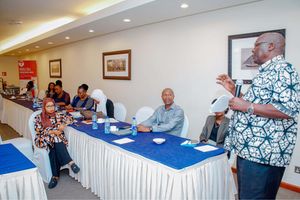Why ban on second-hand clothes won't work in East Africa

A ban on used clothes is an uphill task for the East African Community member states because the clothing are a lifeline to many low-income earners. PHOTO | FILE
What you need to know:
- Banning mitumba, however, comes with the risk of losing eligibility for duty-free clothing exports to the US market under the African Growth and Opportunity Act (Agoa).
Arusha. A ban on imports of second-hand clothes, popularly known as mitumba, may not work in the East African Community (EAC) bloc, at least for now.
Stakeholders insist that the impact would be costly for low-income people who cannot afford new apparel from the shops.
Trade experts, in particular, find no evidence that weakening the second-hand clothing sector will lead to a revival of the textile industry in the region.
Moreover, mitumba is a multi-million-shilling business for thousands of importers and traders who could hardly afford to part with it.
“The low-income people cannot afford to buy new clothes from the shops”, said Jonathan Danga, a hotel employee in Arusha.
He added that small traders, many of whom are women, would suffer enormously should the ban be enforced.
The African ministers for trade and industries recently adopted a protocol that would effectively stop imports of second-hand clothes.
The protocol adopted on June 1, 2023, prevents trading mitumba across the continent under the African Continental Free Trade Area (AfCFTA).
The meeting was convened in Nairobi to assess progress and address critical aspects of the pact’s implementation.
AfCFTA secretary general Wamkele Mene said that the decision to prevent the trade of second-hand clothes was “an important step to encourage value-addition and industrialization in Africa”.
He concurred with the position taken by the ministers that the African market should not be used as a dumping ground for used clothes coming from outside Africa.
Prevention of mitumba imports would, therefore, protect the African textile industries and promote investment in the sector.
But Mr Danga and others reached by The Citizen insist that many traders would be rendered “incomeless’ should the ban be enforced.
He added that Tanzania does not have enough textile industries to produce clothes that would meet the rising local demand.
Walter Maeda, the chairman of the Tanzania Chamber of Commerce, Industries and Agriculture, Arusha Regional Chapter, said it would be surprising if a ban on mitumba imports is effected.
He said instead of banning second-hand clothes imports, dozens of the textile industries that have closed down should be revived.
He cited the Kiltex mill in Arusha, one of the oldest in the country, which has been converted into a godown after its machines were plucked out.
Other textile mills, some of which are no longer in production, include Mwatex, Sunguratex, Mutex, and Urafiki.
“Let us revive those industries and make them operate efficiently before thinking of a ban on second-hand clothes imports,” he told The Citizen.
Mr Maeda said mitumba imports were dependable income for the middle- and low-income traders to eke a living.
Some trousers or shirts can cost as little as Sh5,000 per piece, nearly four to five times less than the same merchandise in shops.
A suit plucked from the mitumba bale can cost between Sh60,000 and Sh70,000, compared to Sh450,000 to Sh500,000 in the shop.
An Arusha resident, Reuben Mcharo, admitted that he had not bought a new shirt in a shop because many of “our textile mills are long dead.”
He added that the ‘mitumba’ sector has employed hundreds of people in Arusha, adding that “we have not reached a point of abandoning them”.
The East African Business Council (EABC) executive director, John Bosco Kalisa, said the mitumba issue was a reflection of falling industrial production in the region.
He cited Kenya, where the manufacturing sector’s contribution to the GDP had dropped to 9.8 percent from 16 percent in the past few years.
He said that although the EABC was passionate about local content, banning second-hand clothing imports would not work without alternative means.
“There is no other option for now because mitumba is an extensive business that has pulled in many traders, distributors, and importers,” he pointed out.
Mr Kalisa challenged the EAC partner states to invest in the textile sector not only to produce clothes but also to create jobs for the unemployed.
He told this newspaper that the sector has generally performed poorly in the region, leading to the collapse of dozens of the once-famous textile mills.
He blamed the woes on high operational costs, especially with electricity, poor access to finance, and a limited source of inputs.
This is not the first time that the second-hand clothing issue has emerged among policymakers and trade experts in Africa and the EAC.
For instance, in 2015, the EAC Heads of State adopted a three-year gradual process to phase out the importation of second-hand clothes and footwear.
It was deemed necessary to make EAC textile and leather factories self-sufficient to serve the local and international markets.
Banning mitumba, however, comes with the risk of losing eligibility for duty-free clothing exports to the US market under the African Growth and Opportunity Act (Agoa).
This is because the US government sees stopping used clothing imports as a blockage of free trade, according to the US State Department.




